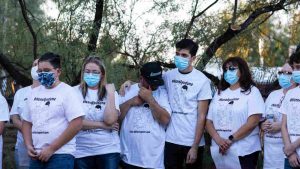SEATTLE, WA – In what was perceived to be a controversial subpoena issued by the Seattle Police Department against news organizations for unpublished footage of the May 30th riots, the SPD has reportedly backed down from pursuing the granting of said subpoena.
The Seattle Police Department has dropped its demand for news stations to hand over raw footage of a large-scale riot from May 30th.https://t.co/pJCN9bTWq8
— KOMO News (@komonews) September 22, 2020
The subpoena was not quashed indefinitely, but it was getting stalled through the courts and the Supreme Court had stated that they wouldn’t issue a ruling until some time in late 2021.
According to the SPD, given the time that they’d have to wait for said footage to be decided on, they issued a statement saying they would “withdraw the subpoena.”
KOMO News was both against the subpoena and also named in the subpoena. They also ironically shared the story of the SPD withdrawing the pursuit:
“KOMO-TV was among the media outlets fighting that request, arguing it put their own news staff at risk.”
Seattle police have ended their subpoena effort to get unpublished photos/videos from news orgs. News organizations were taking the case to the Washington Supreme Court to enforce Shield Law protections. https://t.co/K1qjpBuoYU
— Ginny LaRoe (@GinnyLaRoe) September 22, 2020
Unpublished footage captured by the press has been a hot-button issue in the era of these violent riots and protests. The reason being is that there’s an extremely high likelihood that unaired footage has potentially captured felonies in commission during these very riots.
Obviously, police certainly have a fair interest in having an opportunity to review footage to assist with ongoing investigations – which was the exact purpose of the subpoena that was causing a stir since news of it came out in July.
Downtown Seattle on May 30th resulted in six police vehicles being fire-bombed, police guns were stolen from vehicles and of course there was copious amounts of looting.
But shield laws for members of the press create protections similar to what priests and lawyers have when it comes to compelling the release of certain information – which caused so many delays in the courts as to whether the subpoena infringed upon those shield laws.
But Washington’s own shield laws do pose gaps, which is why some courts okay’d the subpoena and when elevated to the Supreme Court there was likely going to be some debate there.
According to the state law, the following is defined in RCW 5.68.010:
“(1) Except as provided in subsection (2) of this section, no judicial, legislative, administrative, or other body with the power to issue a subpoena or other compulsory process may compel the news media to testify, produce, or otherwise disclose:
“(a) The identity of a source of any news or information or any information that would tend to identify the source where such source has a reasonable expectation of confidentiality; or
“(b) Any news or information obtained or prepared by the news media in its capacity in gathering, receiving, or processing news or information for potential communication to the public, including, but not limited to, any notes, outtakes, photographs, video or sound tapes, film, or other data of whatever sort in any medium now known or hereafter devised. This does not include physical evidence of a crime.”
But when looking at the notation of “except as provided in subsection (2) of this section”, that’s exactly where the SPD could have been granted the final “okay” to proceed from the Supreme Court:
“(2) A court may compel disclosure of the news or information described in subsection (1)(b) of this section if the court finds that the party seeking such news or information established by clear and convincing evidence:
“(a)(i) In a criminal investigation or prosecution, based on information other than that information being sought, that there are reasonable grounds to believe that a crime has occurred.”
Considering that there was a “criminal investigation” for the May 30th riots linked to firebombing of police cars and thefts of police weapons, those elements could serve as “reasonable grounds” that a crime happened while also serving as being “based on information other than that information being sought.”
People doing things in public that you are filming aren’t sources. They are just people in public. Self incriminating would require that you be committing crimes yourself, recordings of others actions that you are not party to wouldn’t seem to be included logically.
— Chris Carlile (@Jbrwokyruges) September 22, 2020
Basically, the SPD didn’t need the footage to ascertain that police cars were torched and weapons stolen on May 30th – they already knew that happened – the subpoena was meant to help determine who was responsible.
Which also falls under RCW 5.68.010 (2)(b)(i) which further clarifies that any civil or criminal case where “the news or information is highly material and relevant” can force the hands of journalists to deliver the goods when subpoenaed.
Still, when it’s all said and done, the SPD has ceased the endeavor. But it would have been interesting to see how the higher courts would’ve interpreted the law.
As mentioned earlier, we at Law Enforcement Today have previously reported on this matter when the lower courts actually approved the subpoena.
Here’s that original report.
_
KING COUNTY, WA – On July 23rd, King County Superior Court Judge Nelson Lee ruled that media outlets need to hand over any unpublished photos or videos to police with regard to the May 30th riot that rocked Seattle. Thus, affording police the ability to track down even more bad actors and criminals from the violent protest.
Judge rules media outlets have to turn over images, footage of May Seattle protest that turned violent https://t.co/vgxq1ElYFh
— J. W. (@wolfjon4) July 24, 2020
The judge found that the subpoena issued by the Seattle Police Department is completely justified and enforceable, as it serves the departments ability to further investigate the theft of police guns and burning of SPD vehicles that transpired on May 30th.
Police are still seeking the suspects responsible for damaging six vehicles, breaking police car windows, and also stealing the likes of equipment from the interiors which included police weapons. The subpoena is specifically trying to hone-in on a four-block area during a 90-minute window during May 30th.
While Judge Lee stated that police can use the footage to secure evidence against those responsible for the arson, vandalism and theft – police may not use the footage to pursue crimes outside of that scope reportedly.
The news outlets subpoenaed were the Seattle Times, and also local tv stations KIRO7, KING5, KOMO4 and KCPQ13. Michele Matass Flores, the executive director of the Seattle Times, claimed that this subpoena put’s their “staff’s physical safety at risk,” as well as their own “independence.”
Arson, assault, destruction of property, looting, break and enter are not constitutionally protected rights. Just so you’re aware.
— Doug (@bdm7250) July 25, 2020
Flores claimed that the media’s job is to hold the government accountable to the public and not the other way around:
“The media exist in large part to hold governments, including law enforcement agencies, accountable to the public. We don’t work in concert with government, and it’s important to our credibility and effectiveness to retain our independence from those we cover.”
What Flores fails to realize is that adhering to a subpoena isn’t working “in concert” with the government – as that notion implies that there’s a mutually agreed upon collaboration. A subpoena is order compelling someone to share potential evidence – being compelled and working in concert are two totally different things.
However, the media habitually does work in concert with the government – especially when they publish stories about wanted criminals and suspects. The purpose of the media has always been to report on events, instances, and the ilk; but not to hold any one particular aspect of society accountable to the other.
It is unclear as to whether the media outlets will challenge the ruling reached on July 23rd at this time.
_
Want to make sure you never miss a story from Law Enforcement Today? With so much “stuff” happening in the world on social media, it’s easy for things to get lost.
Make sure you click “following” and then click “see first” so you don’t miss a thing! (See image below.) Thanks for being a part of the LET family!



















